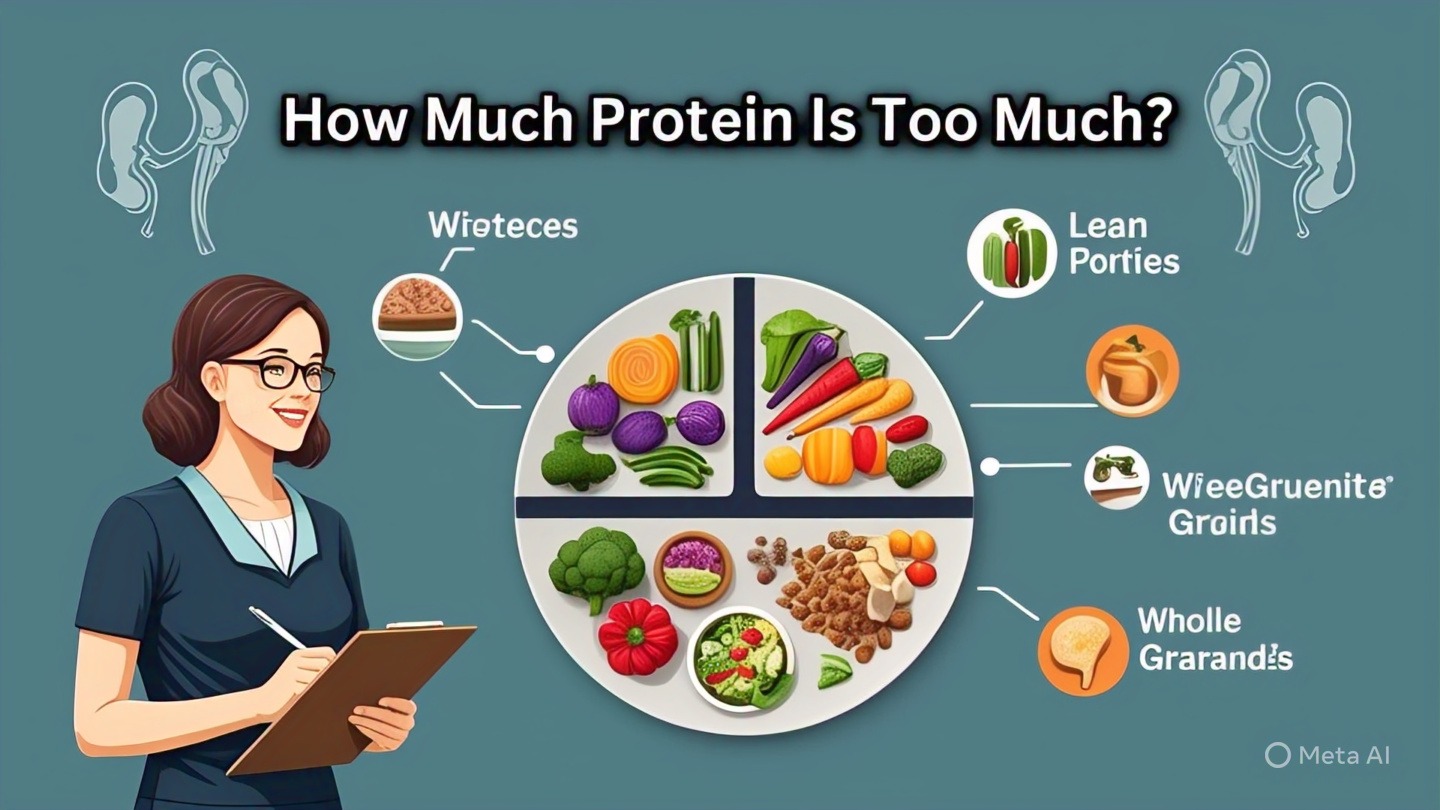Understanding Protein and Its Role in the Body
Protein is a vital macronutrient that accounts for about 16% of our body weight, playing a crucial role in cellular function and structure. It serves as the building block for muscles, skin, enzymes, and hormones, making it essential for growth, repair, and overall health.
What Are the Functions of Protein?
Proteins perform a myriad of functions within the body. They facilitate muscle growth and repair, which is critical for athletes and active individuals. Additionally, proteins are essential for the production of enzymes that regulate biochemical reactions and hormones that maintain homeostasis. Proteins also support immune function and transport nutrients throughout the body, underscoring their significance in maintaining overall health.
Daily Protein Requirements: How Much Do We Need?
The recommended dietary allowance for protein varies based on age, gender, and activity level. Generally, adults should aim for about 46 grams per day for women and 56 grams per day for men. However, those engaged in intense physical activity or strength training may require higher amounts to support muscle synthesis and recovery. It’s important to tailor protein intake to individual needs for optimal health.
Protein Sources: Animal vs. Plant-Based
Protein can be derived from both animal and plant sources. Animal-based proteins, such as meat, fish, eggs, and dairy, provide all essential amino acids and are generally considered complete proteins. On the other hand, plant-based proteins, found in legumes, nuts, seeds, and grains, are often incomplete but can be combined to ensure a balanced amino acid profile. Incorporating a variety of protein sources into your diet can help meet nutritional requirements while promoting overall health.
Common Myths About Protein Overconsumption
In the realm of nutrition, misconceptions about protein often lead to unnecessary fear and confusion. A common myth is that high protein intake is dangerous for everyone, when in fact, it primarily concerns those with pre-existing kidney conditions. For healthy individuals, protein plays a vital role in muscle growth and repair without posing significant risks to kidney health.
Do High Protein Diets Cause Kidney Damage?
Many people believe that high protein diets can lead to kidney damage. However, research indicates that this concern primarily applies to individuals with pre-existing kidney issues. In healthy individuals, studies show no significant adverse effects on kidney function due to increased protein intake. The kidneys are equipped to handle normal variations in protein consumption, efficiently processing the waste products generated from protein metabolism.
Is More Protein Always Better?
While protein is essential for various bodily functions, more is not always better. Excessive protein intake can lead to other health concerns, such as nutrient imbalances or digestive issues. It’s crucial to focus on a balanced diet that provides adequate protein along with other macronutrients. Moderation is key; understanding your individual needs can help you tailor your protein intake effectively.
Protein Myths: Busted!
Debunking myths surrounding protein consumption is vital for making informed dietary choices. Many myths suggest that high protein diets are inherently harmful or that they lead to significant health problems. The reality is that for most healthy individuals, protein can be consumed in higher amounts without detrimental effects on health. Recognizing these misconceptions can lead to a more balanced approach to nutrition and overall well-being.
The Science Behind Protein and Kidney Health
The kidneys play a vital role in processing protein in the body. When we consume protein, it gets broken down into amino acids, which are then utilized for various bodily functions, including muscle repair and hormone production. The kidneys filter waste products from this metabolic process, ensuring that harmful substances are excreted while essential nutrients are retained.
How Do Kidneys Process Protein?
Kidneys are responsible for glomerular filtration, which involves filtering blood to remove waste. When protein is metabolized, nitrogenous waste, primarily urea, is produced. Healthy kidneys efficiently eliminate these waste products from the bloodstream. In this way, they maintain a balance, ensuring that amino acids and other crucial compounds are not lost in the process.
Current Research Findings on Protein and Kidney Health

Recent studies indicate that high protein intake does not adversely affect kidney function in healthy individuals. Research has shown no significant change in kidney health markers, even with increased protein consumption. This is a crucial finding, as it challenges the myth that high protein diets are inherently harmful to kidney health.
Healthy Individuals vs. Those with Kidney Disease
While healthy individuals can typically consume higher levels of protein without concern, the scenario is different for those with pre-existing kidney conditions. For individuals with kidney disease, managing protein intake is essential, as excessive consumption can exacerbate their condition. It is vital for these individuals to work closely with healthcare professionals to determine appropriate dietary guidelines tailored to their specific needs.
Who Should Be Concerned About Protein Intake?
Not everyone needs to be overly cautious about protein consumption, but certain individuals should pay close attention to their intake. Those with existing kidney disease are the primary group that should monitor their protein consumption closely, as higher levels can exacerbate their condition.
Additionally, individuals with risk factors such as diabetes, hypertension, or a family history of kidney issues should also be mindful of their protein levels. These factors can increase the likelihood of kidney problems, making it essential to consider dietary choices carefully.
Risk Factors for Kidney Health
Risk factors for kidney health include chronic conditions like diabetes and hypertension, which can strain kidney function over time.
People who are older or have a family history of kidney disease should also be vigilant about their dietary habits.
Regular check-ups can help identify early signs of kidney issues, allowing for proactive management of protein intake.
Recommended Protein Intake for At-Risk Populations
For individuals at risk, the recommended protein intake can vary widely based on their health status.
Healthcare professionals often suggest a lower protein diet for those with kidney disease, typically around 0.6 to 0.8 grams of protein per kilogram of body weight.
This tailored approach helps minimize strain on the kidneys while still providing necessary nutrients.
Consulting Healthcare Professionals
Consulting with healthcare professionals is paramount for anyone concerned about their protein intake, especially if they have pre-existing health conditions.
Dietitians or nephrologists can offer personalized guidance based on individual health needs and dietary preferences.
Regular assessments can help adjust protein recommendations, ensuring both kidney health and overall well-being are prioritized.
Signs and Symptoms of Protein Overconsumption
When it comes to protein intake, moderation is key. While protein is essential for muscle repair and overall health, overconsumption can lead to several uncomfortable symptoms.
Physical Signs of Protein Overconsumption
One of the most noticeable physical signs of excessive protein consumption is dehydration. As the body metabolizes protein, it requires more water to eliminate the byproducts, which can lead to increased thirst and dry mouth. Additionally, you may experience fatigue and reduced energy levels, as the body diverts resources to process the excess protein instead of fueling other functions.
Digestive Issues Linked to High Protein Intake
High protein diets can also cause a range of digestive issues, including constipation, bloating, and gas. This is often due to a lack of dietary fiber, which is commonly found in fruits, vegetables, and whole grains. When protein intake overshadows these fiber-rich foods, digestive discomfort can become a frequent issue. If you notice persistent digestive discomfort, it may be time to reevaluate your protein sources and overall dietary balance.
When to Seek Help for Protein-Related Concerns
If you suspect that you’re consuming too much protein, especially if you experience dehydration, digestive issues, or unusual fatigue, it’s essential to consult a healthcare professional. They can help identify whether your symptoms are related to protein overconsumption or other dietary factors. Regular check-ups can ensure your nutrition remains balanced and healthy, preventing potential long-term health issues.
Balancing Protein Intake for Optimal Health
Maintaining a balanced diet is crucial for overall well-being, and this includes getting the right amount of protein. While protein is essential for muscle growth, repair, and overall health, it’s important to consume it in moderation along with adequate carbohydrates and fats. This balance ensures that your body receives all the nutrients it requires to function optimally.
Creating a Balanced Meal Plan
To create a balanced meal plan, start by integrating a variety of food groups. Aim to include lean protein sources, whole grains, healthy fats, and plenty of fruits and vegetables. Planning meals ahead can help you monitor your protein intake while ensuring you meet your nutritional needs. Consider using a plate method: fill half your plate with vegetables, a quarter with protein, and the other quarter with whole grains. This visual guide simplifies meal planning and promotes a balanced approach.
Healthy Protein-Rich Foods to Include
Incorporate a variety of protein-rich foods into your diet to promote health. Lean meats like chicken and fish, plant-based options such as beans, lentils, and tofu, and dairy products like yogurt and cottage cheese are excellent choices. These foods not only provide high-quality protein but also come packed with essential vitamins and minerals. Including diverse protein sources can also help you avoid monotony in your diet, making it easier to stick to healthy eating habits.
Portion Control and Protein Intake
Portion control is key when it comes to protein intake. While it’s important to consume enough protein, overconsumption can lead to unwanted health issues. A general guideline is to aim for about 20-30 grams of protein per meal, depending on your activity level and health goals. Measuring portions using your hand as a guide can help you maintain appropriate serving sizes. Remember, listening to your body’s hunger cues and adjusting portions accordingly is vital for achieving and maintaining optimal health.
Conclusion: The Key Takeaways on Protein Consumption
Understanding the role of protein and managing intake is crucial for maintaining optimal health. Most healthy individuals can safely enjoy higher protein diets without concern for kidney health. This debunks the myth that high protein consumption is universally harmful, especially when no underlying kidney conditions exist.
Emphasizing Balance Over Restriction
A balanced diet is essential for overall well-being. Instead of focusing solely on protein, individuals should aim for a diet that includes a variety of macronutrients, such as carbohydrates and fats. This approach not only supports muscle growth and repair but also ensures that the body receives all the necessary nutrients for optimal function.
Staying Informed About Nutrition
Staying informed about nutrition is vital in navigating the myriad of dietary myths that exist today. Research consistently shows that protein plays a beneficial role in health when consumed in moderation and balanced with other nutrients. Educating oneself on the facts surrounding protein can lead to healthier dietary choices and improved overall health outcomes.
The Importance of Individualized Health Plans
Lastly, individualized health plans are crucial for addressing specific dietary needs and health goals. Consulting with healthcare professionals can provide tailored advice on protein intake, especially for those at risk for kidney issues. Each person’s body responds differently to dietary changes, making personalized guidance invaluable for achieving optimal health.
